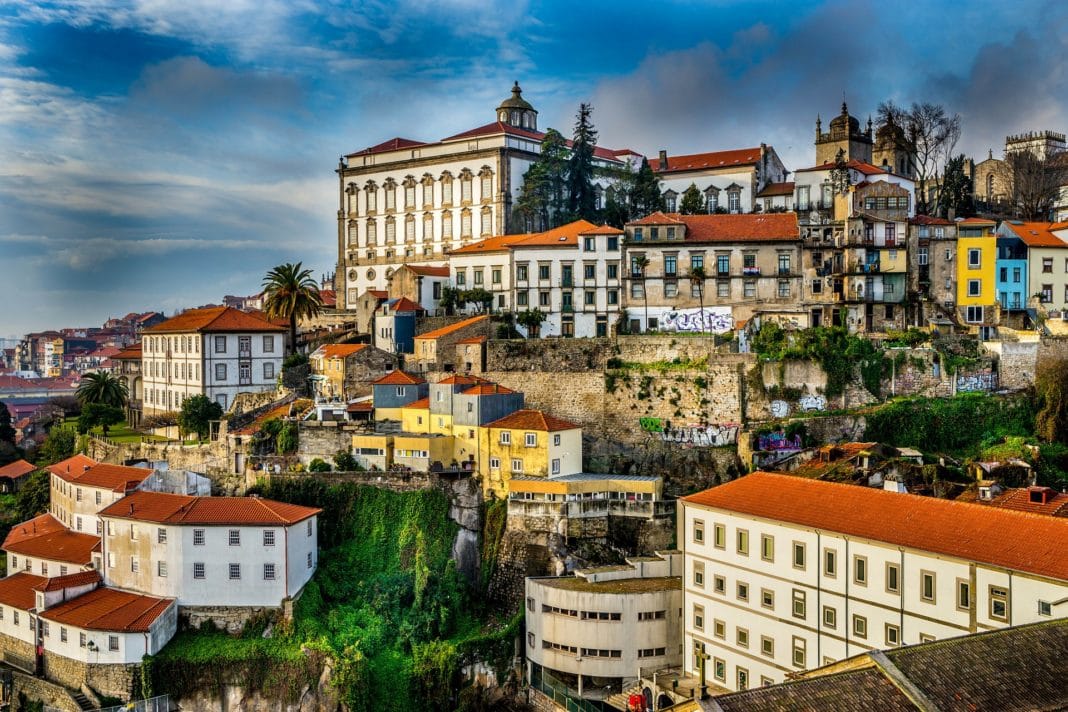Portugal’s culture and language is quite spectacular and worth educating yourself about.
Portugal might be small geographically, but it is certainly worth your time. Whatever it lacks in square mileage, Portugal makes up for in its colorful culture. This southern European nation is located along the Iberian Peninsula. With Spain on one side and the Atlantic Ocean on the other, Portugal developed its personal heritage from each of these. The Spanish cultural influences are notably less than the maritime, however. Though Spain and Portugal are located within close proximity, these nations certainly retain much of their individuality. In fact, you just might encounter slight hostility towards Spaniards when you stroll through Portugal. This is good to keep in mind as you begin to learn Portuguese phrases and converse with locals here.
On a more positive note, the oceanic influence is quite strong within Portugal’s culinary culture. If you plan on eating out here, keep in mind that Portugal derives a considerable portion of its main dishes from the sea. Grilled sardines and salt cod are two nationally served dishes in Portugal. Even if you are not partial to fish dishes, we would encourage you to get out of your comfort zone during your time here.
Of course, before you can dive into the culture and gastronomy of this exotic nation, you need to know a bit about the language. Learning Portuguese phrases is a sure way to help you succeed during your time here. Taking the opportunity to educate yourself on important aspects of a country’s culture and language is both respectful and practical. This is no different when it comes to Portugal. Before you start your trip itinerary, go ahead and learn some basic Portuguese phrases.
These are some helpful Portuguese phrases and culture tips you should know.
Tips for learning Portuguese.
At first glance, you might think that Portuguese is an uncommon language. After all, it is reserved to very exclusive nations, right? As a matter of fact, Portuguese is the sixth most spoken language around the world. Portuguese is not only spoken in Portugal, but it is also the national language of Brazil. Yes, there is no Brazilian language. It is actually Portuguese. With these two nations alone, the Portuguese speakers reach extremely high numbers. With the hundreds of millions of speakers, it is no surprise that learning this language will take you far. If you want a truly immersive experience, visit either Portugal or Brazil during your learning process.
For those who have encountered Spanish, you likely are also aware of its wide reach. If you took Spanish in high school or are a native speaker, you just might have an advantage when it comes to learning Portuguese. Portuguese and Spanish are extremely similar languages, in both grammar and enunciation. Because of this, Spanish speakers can often get by in basic conversation with Portuguese speakers. In this context, it is generally easier to comprehend what the other person is saying. It is less simple to generate a response in their same language. Nonetheless, these linguistic connections help ease the difficulty of learning a brand new language.
Upon studying the Portuguese language, you will find that it has its own variances in comparison to other romance languages. These differences are what make Portuguese entirely its own. Portuguese uses the infinitive in peculiar ways, as it has a personal infinitive and a future subjunctive. If you have ever studied a language, you know that the grammar is the most challenging concept to grasp. For those seeking to truly learn Portuguese, and not simply a few Portuguese phrases, find some resources with basic grammar information. It makes a world of a difference when you understand the foundations of the language syntax before diving into sentence construction and conversation comprehension.
Portuguese culture
Portuguese culture is quite warm and inviting by nature. You just might find yourself feeling very welcome as you get to know the various communities within this nation. This makes learning Portuguese phrases even more important as you travel, so you can better connect with the locals. Here, the family is the central aspect of culture. Know that Portuguese families are generally close, and the social structure stems from this extended familial unit. While the locals should be open and willing to chat with you, know that politeness is also an important part of the culture. If you encounter someone who appears unusually formal, know that they are being extremely polite out of courtesy. You also should carry yourself in a respectful manner as you interact with the locals in Portugal.
Portuguese greetings
When it comes to greetings in Portugal, keep in mind that the initial greetings are more reserved. Your first interaction with a local might be quite polite and simple. Expect a handshake and direct eye contact. This is also where knowing Portuguese phrases comes in handy, as you can quip the appropriate salutation for the time of day. As you get to know the person, the personal greetings become increasingly warm. Women kiss each other twice on the cheek, while men hug and handshake each other. When you greet a women, use the proper form of address, ‘senhora,’ for a man it is ‘senhor.’ This is the appropriate way to begin the relationship. Once you receive permission, you may then use the person’s first-name.
Here are some basic Portuguese greetings you should know.
Bom dia/Boa tarde/Boa noite — Good morning/afternoon/night
Olá — Hello
Oi — Hi
Alô/Está lá — Hello (on the phone)
Tchau — Bye
Até logo! — See you later!
Até amanhã — See you tomorrow
Adeus — Goodbye (formal)
Tudo bem? — How are you?
Useful everyday Portuguese phrases.
If you want to get past a basic initial conversation, it is important to know a little more than just ‘hello.’ These helpful Portuguese phrases are just what you need to get by during your travels in Portugal or Brazil. While many people do speak English in the major cities, if you find yourself outside the general tourist areas, you might have trouble communicating. A good rule of thumb is to always assume you will not encounter any English speakers. This helps keep your demeanor respectful and your mind open to learning a new language. It also reminds you to prepare ahead of time for basic needs you will have when exploring a foreign country. Use these everyday Portuguese phrases to get you pointed in the right direction. Quite literally.
Onde fica o banheiro? – Where is the bathroom?
Você fala inglês? – Do you speak English?
Eu não entendo. – I don’t understand.
O quê? – What?/Say that again?
Não falo português. – I don’t speak Portuguese.
Quanto custa isso? – How much does this cost?
A conta, por favor. – Check, please.
Que legal!; Que beleza! – How cool!
Essa cidade é maravilhosa! – This city is marvelous!
Muito bom – Very good
Valeu! – Thanks (informal/colloquial)
Mais uma! – One more (drink)!
Other things you should know before visiting Portugal.
If you choose to visit Portugal, expect to experience an array of art. Portugal has long been known for its deep expressions of art. You can find spectacular artistic exhibits and ancient art museums in major cities such as Lisbon and Braga. Even if you do not spend much time in the larger cities, you can generally encounter art anywhere in Portugal. Look into the various expressions of Portuguese artwork before you take a trip here so you know just what to expect. Prepare to be blown away by both the local and historical art scenes here.
For the coffee lovers, it is important to know what if you order café in Portugal, you are getting an espresso. If you like your coffee a little lighter, order a meia de leite (half-coffee and half-milk) or a galão (a shot of espresso with triple the milk). These are great ways to sample the delicate espresso offerings without having to deal with the bitterness of espresso.
Come for the food and stay for the vibrant culture when you visit Portugal.
As you can see, there is a lot to learn and explore when it comes to Portuguese culture. Learning basic Portuguese phrases is the ideal way to ensure that your travel experience is positive. It is also very respectful and appreciated when you travel with an open mind. You should always be prepared to learn something new when you visit a place you have never been before.
Related Article: Best Portuguese Islands: Why You Should Skip the Mainland







